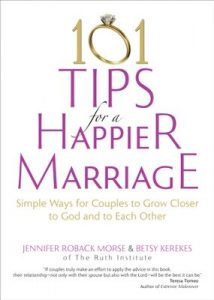101 Tips for a Happier Marriage: Simple Ways for Couples to Grow Closer to God and to Each Other
by Jennifer Roback Morse and Betsy Kerekes
 Where some books have a dedication, this book has a page with three centered lines.
Where some books have a dedication, this book has a page with three centered lines.
“God is God.
You are not.
Your spouse is not.”
Those ten words sum up the philosophy of 101 Tips for a Happier Marriage. It is a slender, easy-to-read volume of 101 pages (plus an introduction and a few chapter heading pages), each with only two paragraphs: one spelling out the marriage tip and one saying a little more about it. How long could it take to read 202 paragraphs? But this book is not for speed-reading. Each tip needs to be thought about and practiced for at least a day, more likely for weeks and months. Therefore I would suggest reading no more than one page—two paragraphs—per day. Add another day, really just a few minutes, to read the Introduction.
Before getting to the tips, 101 Tips for a Happier Marriage starts off reviewing the bold commitments we make in a Catholic marriage: to love my spouse for the rest of my life, to love even if my spouse becomes difficult, to continue behaving lovingly even if my spouse becomes nearly impossible to live with, and to embrace marriage as my path to holiness. An engaged person might want to read 101 Tips for a Happier Marriage to get a good idea of how those commitments play out in everyday married life. A newly married person might want to read it shortly after the honeymoon, especially “after the honeymoon is over” emotionally. Anyone who wants a better marriage or who feels perturbed in marriage could make good use of the book.
“Simple Ways for Couples to Grow Closer to God and to Each Other” is an appropriate subtitle. All 101 tips are easy to understand and none require special understanding, training, or supplies. The reader needs only an open heart and a desire to grow. I wonder why the authors put God before “each other” in the subtitle. The book’s emphasis is on what the person who reads it can do to make a difference for the marital relationship. Growing closer to God will inevitably follow. If we tend to the ways in which God calls us, we will grow closer to the vocation’s author. Once we’ve said our marriage vows and entered the sacrament of marriage, we can be pretty sure that God is telling us to work on our commitments.
It is within marriage that we learn the true nature of spousal love. No longer “going together” or merely “living together,” we have pledged ourselves to one another and to mutually growing through true love’s joys and difficulties. Marriage and the love of husband and wife are good for the couple, for their children, their extended family, and for society. So this book has not only personal benefits for the reader and tip practitioner, but benefits rippling out into the family and the wider community from the loving marriage.
Many tips remind me of lessons I have learned in marriage or lessons I must still work on. In my mid-30s I practiced tip number 2, “Help your spouse grow by being the first to step outside the comfort zone.” I was having a spiritual “growth spurt” and feared that my husband might not understand, might even resent my increased desire for prayer and the sacraments. It was a leap of courage to talk with him about my experiences and concerns. The discussion rewarded me as I was able to gain his support and to come to understand how his spirituality differed from mine. Now in my forty-fifth year of marriage I am putting new effort into tip number 46, “Use the Generosity Gauge, rather than the Fairness Filter.” Somewhere along the line I started filtering my perspective but I want to renew a generous attitude.
Do not buy this book to change your spouse. Do not give it to your spouse to work on. The tips are effective only when applied to oneself. If you change, your marriage will change. This book is also not for anyone dealing with domestic violence or addictions of any kind. It cannot replace specialized professional assistance. Both authors are with the Ruth Institute, a nonprofit educational organization that promotes lifelong married love. Jennifer Roback Morse is the founder of the Ruth Institute and the author of books on marriage and economics as well as academic and public policy articles. Betsy Kerekes is a professional journalist who writes newsletters and manages the Ruth Institute’s blog.
About the Reviewer:
Mary Ann Paulukonis is a writer, artist, and consultant for leadership and ministry.
Disclaimer: Book reviews do not imply and are not to be used as official endorsement by the USCCB of the work or those associated with the work. Book reviews are solely intended as a resource regarding publications that might be of interest to For Your Marriage visitors.




